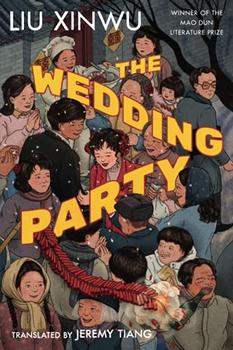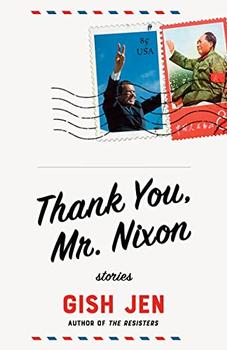Summary | Excerpt | Reviews | Beyond the book | Read-Alikes | Genres & Themes | Author Bio

In 1982, the year Liu Xinwu's The Wedding Party takes place, China was at a political and economic turning point (see Beyond the Book). Mao's Cultural Revolution was over, but China was not yet the global power it is today. Some travel into and out of the country was possible, and international trade was being embraced. The Wedding Party offers a unique glimpse into that time period. Originally published in 1985, the novel now shines in its English translation by skilled and beloved translator Jeremy Tiang.
Taking place over the course of a single day, Liu's book is about family and community. It begins with Auntie Xue, a Beijing woman who lives in a siheyuan (a residential building occupied by multiple families). Auntie Xue's son Jiyue is about to be married, and we watch as events, both good and bad, unfold one after another.
The Wedding Party boasts a large cast of characters, and almost all of them are painted with lavish detail. Take the 26-year-old apprentice chef who is catering the wedding, Lu Xichun, a boy who started out with few prospects but nevertheless was inspired by the right people and is now on a path to some success, with a daunting day ahead of him. In Chapter 2, we are presented with his backstory, his relationships and his motivations. The anticipation and excitement of Chapter 1 — told from Auntie Xue's perspective — is switched out for nerves and trepidation.
This switch in perspectives between chapters is constant, and it demonstrates the main themes of this novel, as well as why it is such a success. The titular wedding party is merely a plot device; at its core, the story is about the experiences of ordinary people, both as individuals and as a community. Every character here is experiencing the day differently; they are carrying their own burdens, performing different duties, hating and liking different people.
The Wedding Party is a discordant instrument, lacking in cohesion and demonstrating the chaos of ordinary life. In this way, it is a warmingly relatable novel. Weddings are stressful, no matter who you are. Unexpected problems are likely to occur, uninvited guests may cause trouble and emotions will run high.
Liu does something truly remarkable in juggling the cast of characters: Beyond fleshing them all out into flawed and lovable people, he also uses them to show how the Cultural Revolution and its aftermath were experienced by ordinary residents of China's capital city.
The Wedding Party takes time to dive into its characters' backstories, some of which involve grandparents who remember pre-revolution China. Others involve factory work and tireless labor, as well as a lack of food and freedom. But, despite being weighted and poignant, the emotions expressed through these stories are never suffocating or overwhelming. They feel just light enough, because we know that these characters are now in a better situation, both socially and financially.
The flipside to all of this detailed character work is that it can be dizzying. Flitting between members of the ensemble cast means there is a lack of narrative focus — though what keeps things moving is the central wedding and time itself. Nevertheless, moving from person to person does mean our empathy is stretched thin, as there are so many characters to bond with and little time to do so. This can be helped with a reread or two.
Overall, The Wedding Party is a novel that succeeds at painting a picture of ordinary life — giving us a colorful cast of characters, all with detailed stories, motivations and relationships. Liu writes, and Tiang translates, with humor and love and kindness; and it's these elements that shine through the many satisfying narrative threads of The Wedding Party.
![]() This review
first ran in the January 19, 2022
issue of BookBrowse Recommends.
This review
first ran in the January 19, 2022
issue of BookBrowse Recommends.

If you liked The Wedding Party, try these:

by Anne Tyler
Published 2025
A new Anne Tyler novel destined to be an instant classic: a socially awkward mother of the bride navigates the days before and after her daughter's wedding.

by Gish Jen
Published 2022
The acclaimed, award-winning author of The Resisters takes measure of the fifty years since the opening of China and its unexpected effects on the lives of ordinary people. It is a unique book that only Jen could write - a story collection accruing the power of a novel as it proceeds - a work that Cynthia Ozick has called "an art beyond art. It is ...
Some books are to be tasted, others to be swallowed, and some to be chewed on and digested.
Click Here to find out who said this, as well as discovering other famous literary quotes!
Your guide toexceptional books
BookBrowse seeks out and recommends the best in contemporary fiction and nonfiction—books that not only engage and entertain but also deepen our understanding of ourselves and the world around us.